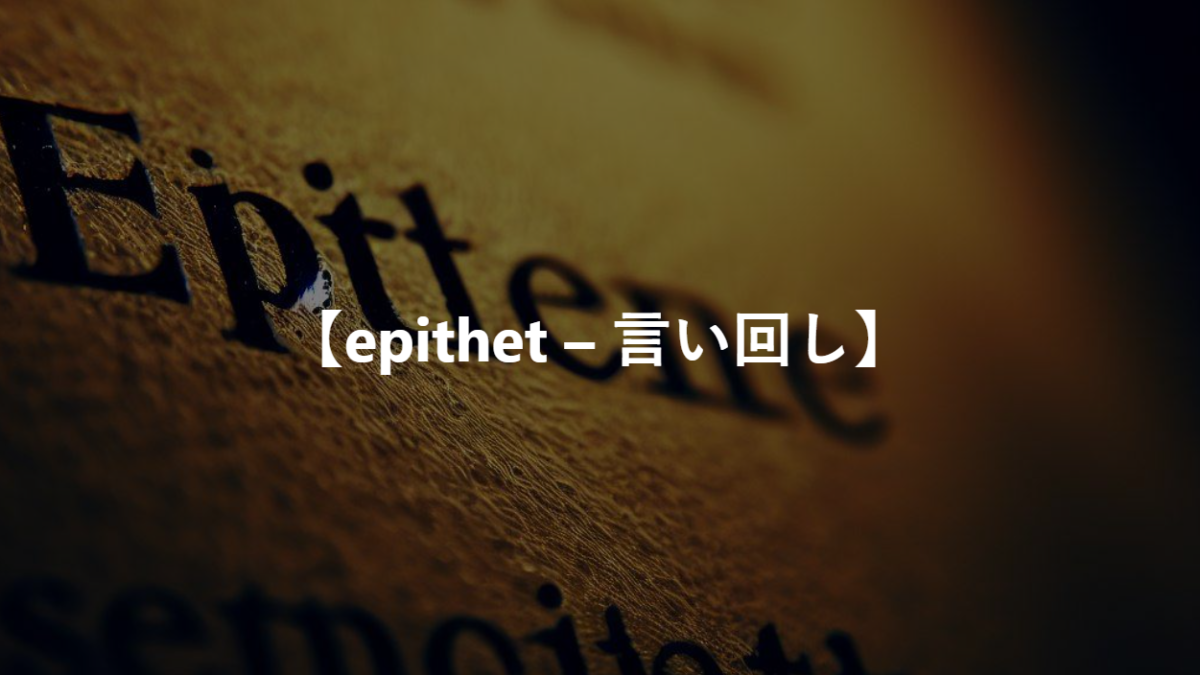語源・類義語・反対語・例文
【Epithet – 言い回し】という単語の語源とか由来を知っていますか?
「Epithet」は、ギリシャ語の「epitheton」から来ています。これは「epi-」(上に)と「tithenai」(置く)の組み合わせから成り、「何かに付け加えられるもの」という意味を持っています。古典ギリシャ文学では、特定の人物や物を説明するために使われる形容詞や短い句のことを指していました。例えば、ホメロスの叙事詩では、勇敢な戦士を「獅子心の」と形容したり、海を「ワイン色の」と表現するなど、特徴的な言い回しや描写で登場人物や物の特性を強調しています。時間が経つにつれて、「Epithet」は、特定の人物や物事に付けられる特徴的な言葉やフレーズという意味で一般的に使われるようになりました。
The word “Epithet” originates from the Greek “epitheton,” which is a combination of “epi-” (upon) and “tithenai” (to place), meaning “something added.” In classical Greek literature, it referred to an adjective or a short phrase used to describe a particular person or thing. For example, in Homer’s epics, brave warriors are described as “lion-hearted,” or the sea as “wine-dark,” using distinctive expressions or descriptions to emphasize the characteristics of characters or things. Over time, “Epithet” has come to be commonly used to mean a characteristic word or phrase attached to a particular person or thing.
この単語の類義語・反対語を教えてください。
類義語
- Descriptor: 記述子
- Adjective: 形容詞
- Nickname: ニックネーム
- Sobriquet: 渾名(あだ名)
- Moniker: 通称
反対語
「Epithet」の反対語は直接的には存在しませんが、その使用目的や効果と反対の概念を考えることはできます。例えば、「Epithet」が特定の特徴を強調するために使われる場合、その特徴を無視するか、または普遍的で特徴のない表現を用いることが対照的な行為となり得ます。
- Generalization: 一般化
- Neutral description: 中立的な記述
この単語を使った例文を5つほど教えてください。
He was known by the epithet “The Great” for his remarkable achievements.
(彼はその驚異的な業績から「偉大なる」という称号で知られていました。)
The author skillfully used epithets to vividly describe the characters in the novel.
(その作家は巧みに言い回しを使い、小説のキャラクターを鮮やかに描写しました。)
The politician’s controversial statement earned him the epithet of “The Divisive Speaker.”
(その政治家の物議を醸す発言が、「分裂を招く演説者」という異名をもたらしました。)
The singer’s powerful voice and stage presence earned her the epithet “The Queen of Soul.”
(その歌手の力強い声とステージ上の存在感が、「ソウルの女王」という呼び名を勝ち取りました。)
The city’s epithet as the “City of Lights” comes from its stunning nighttime illumination.
(その都市の「光の都」という称号は、夜の見事な照明から来ています。)
【epithet – 言い回し】のコロケーション
- Racial epithet (人種差別的な言い回し): 特定の人種や民族グループに対する侮辱的または蔑視的な意味を持つ言葉を指します。社会的な文脈で重要な問題となることが多いです。
- Endearing epithet (親しみやすい言い回し): 愛情や親しみを込めて使われる言い回しで、人物の好ましい特徴や性格を強調します。親しい関係や友情を示す場合に使用されます。
- Literary epithet (文学的な言い回し): 文学作品において、登場人物や風景、物事の特徴を美しく表現するために使われる装飾的な言い回しです。作者の創造性や表現力を示す要素となります。
- Pejorative epithet (蔑称): 人物やグループに対して否定的なイメージを与えるために使われる言い回しです。侮辱や軽蔑の意味を含み、社会的な対立や偏見を反映することがあります。
「epithet」は、人や物事の特徴を独特の言い回しで表現するために用いられる言葉です。これにはさまざまな用途や影響があり、その使用法を見ることで、言葉がいかに強力な表現手段であるかがわかります。
まず、Racial epithetは、人種や民族に対する侮辱的な言葉を指し、社会における重大な問題を浮き彫りにします。これらの言葉は、差別や偏見の存在を示し、その使用は深い傷を残す可能性があります。
次に、Endearing epithetは、愛情や親しみを込めた表現で、人物のポジティブな特徴や性格を強調します。これは、親しい人間関係や友情を示す際に用いられ、温かみのある印象を与えます。
Literary epithetは、文学の世界においてキャラクターや風景を装飾的に美しく表現する言葉です。これにより、作品に深みを加え、読者に強い印象を残すことができます。
一方、Pejorative epithetは、人や集団に対する否定的なイメージを植え付けるために使用される言葉で、軽蔑や侮辱を含んでいます。このような言葉の使用は、社会的な対立や偏見を反映し、しばしば深刻な影響を及ぼします。
The term “epithet” is used to express the characteristics of people or things through unique expressions. It has various uses and impacts, and by examining how it is used, one can see how powerful a tool language can be.
Firstly, Racial epithet refers to derogatory words aimed at specific races or ethnic groups, highlighting significant issues in society. These words indicate the presence of discrimination and prejudice, and their use can leave deep scars.
Next, Endearing epithet is an expression filled with affection and fondness, emphasizing the positive traits and personality of a person. It is used to indicate close relationships or friendships, providing a warm impression.
Literary epithet is a term in the literary world that decoratively and beautifully describes characters or sceneries. It adds depth to the work and leaves a strong impression on the reader.
On the other hand, Pejorative epithet is used to implant a negative image towards individuals or groups, containing contempt or insult. The use of such words reflects social conflicts or prejudices and can often have serious consequences.
epithetを使った英文法問題5問
- 語彙問題次のうち、epithetの意味として最も適切なものはどれですか?
- a. 寓話
- b. 言い回し
- c. 隠喩
- d. 格言
- b. 言い回しepithetは「(人や物の特徴を述べる)形容語句、あだ名」という意味の名詞です。
- 空所補充次の文の( )内に入る最も適切な単語はどれですか?
- The poet Homer often used ( ) to describe his characters.
- a. epithet
- b. epithets
- c. epithetical
- d. epithetize
- b. epithets空所には目的語となる名詞が入り、文脈から複数の形容語句が使われたことがわかるため、複数形のepithetsが適切です。
- 冠詞の選択次の文の( )内に入る適切な冠詞はどれですか?
- “The Great Emancipator” is ( ) epithet often used to refer to Abraham Lincoln.
- a. a
- b. an
- c. the
- d. 無冠詞
- c. the特定の言い回し(The Great Emancipator)を指しているため、定冠詞のtheが適切です。
- 語形変化次の文の( )内に入る適切な単語はどれですか?
- The critic described the author’s writing style as ( ).
- a. epithet
- b. epithetic
- c. epithetical
- d. epithetize
- b. epithetic空所には名詞styleを修飾する形容詞が入ります。epitheticは「形容語句の、あだ名の」という意味の形容詞です。
- 文法的な誤りの指摘次の文には文法的な誤りが1箇所あります。その誤りを含む部分を指摘し、正しい形に直してください。
- The epithet “Richard the Lionheart” was given to the king because of his bravery.
- 誤りはありません。この文は文法的に正しいです。epithetは「形容語句、あだ名」という意味の名詞で、ここではRichard the Lionheartという特定のあだ名を指しています。

